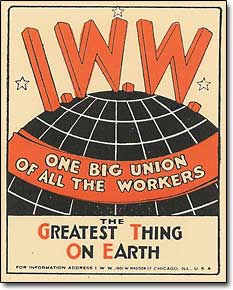Drawing from one of the world’s best collections of materials documenting early industrial workers’ history, U-M’s Labadie Collection of Social Protest is mounting a display of original letters, posters, photographs, sheet music and memorabilia.

“Soapboxers and Saboteurs: 100 Years of Wobbly Solidarity,” an exhibit celebrating the 100th anniversary of the Industrial Workers of the World (IWW), runs Sept. 6-Nov. 26 at the Special Collections Library, on the 7th floor of the Harlan Hatcher Library.
“The working class and the employing class have nothing in common,” the preamble to the IWW’s constitution reads. “There can be no peace so long as hunger and want are found among millions of the working people and the few, who make up the employing class, have all the good things of life.”
“The IWW members are commonly known as Wobblies,” says Julie Herrada, curator of the exhibit and the collection. “The organization attempted to organize all workers into ‘one big union,’ challenged restrictions on First Amendment rights and broke down barriers of race, sex and class in their membership.”
Sometimes called “The singingest union America ever had,” IWW was started in Chicago in June 1905 by Big Bill Haywood of the Western Federation of Miners and others dissatisfied with the lack of progress of the craft unions under Samuel Gompers’ American Federation of Labor. The organization’s direct action tactics, as well as the songs, poetry and lore that have come out of the movement, have attracted some of the most colorful characters in labor history: Joe Hill, Eugene Debs, Mother Jones, Elizabeth Gurley Flynn (Rebel Girl) and Ralph Chaplin, writer of “Solidarity Forever.” The movement held attraction for later singers such as Woody Guthrie and Pete Seeger as well as current artists Utah Philips and Ani DeFranco.
U-M’s IWW centennial celebration, one of many at educational institutions across the United States, will offer a free concert at 8 p.m. Oct. 19 featuring Anne Feeney, recipient of the 2005 Joe Hill Award from the Labor Heritage Foundation.
The IWW also handed out a little red songbook with about 50 songs, usually parodies of well-known melodies sung at meetings, on picket lines, in jails, on freight trains or wherever members happened to meet. If the Salvation Army band started up “In the Sweet Bye and Bye,” Wobblies would use it to accompany their own singing of Joe Hill’s parody “Pie in the Sky.”
Along with the concert, Joyce Kornbluh will talk about the history of her book, “Rebel Voices: An IWW Anthology.” A discussion of current and past IWW labor struggles will follow.
“It has been my fate to be a worker all my life,” wrote Detroit native Jo Labadie, who in 1911 donated the core of U-M’s archive on social protest.
IWW General Headquarters was located in Ypsilanti from 1995-99. During that time, the organization launched an organizing drive against Borders Books in Philadelphia and IWW members picketed stores in several major cities including Ann Arbor. Strikes and picketing for various reforms during this period were held in California, Washington, Pennsylvania, New York, Montana, Africa, Massachusetts, Indiana, Texas, and in Finland, Russia and England.
The exhibit is open 10 a.m.-5 p.m. Monday-Fridays, and 10 a.m.-noon Saturdays. Admission is free. A free reception Oct. 19 will begin at 7 p.m. before the free 8 p.m. concert with Feeney.
Sponsors include the Institute for the Humanities, the University Library, Detroit Branch of the IWW, U-M Department of History, U-M Program in American Culture and the International Brotherhood of Electrical Workers.

